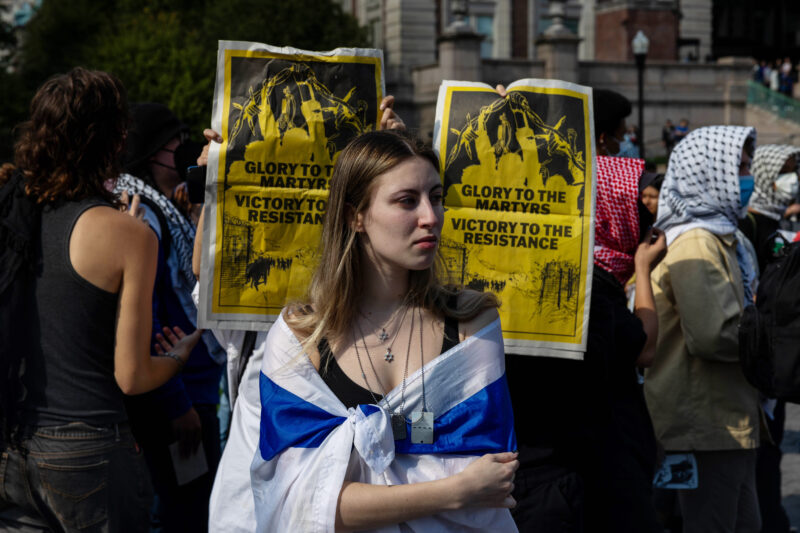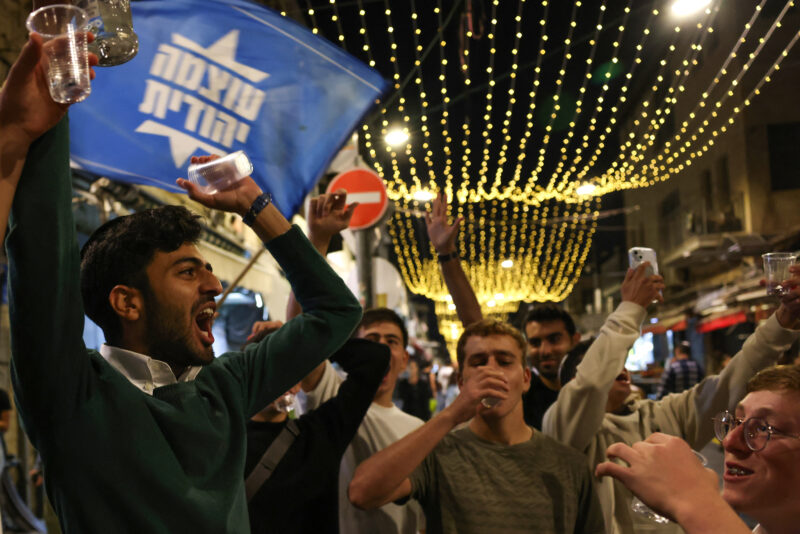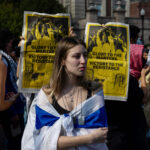‘We all have a stake in this’: White House holds first-ever Jewish Women’s Forum
The summit brought together activists, influencers, rabbis and others to discuss antisemitism, women’s issues and other Jewish communal issues

Shelley Greenspan
Attendees of the White House Jewish Women's Forum in Washington, D.C. on March 9, 2023.
In the ornate Indian Treaty Room in the Eisenhower Executive Office Building in Washington, more than 70 female Jewish leaders gathered on Thursday to hear from Biden administration officials and nosh on hamantaschen to mark both International Women’s Day and Purim.
There were many Washington veterans at the first-ever White House Jewish Women’s Forum. But there were also first-timers — college students and rabbis and social media influencers who had never before earned an invitation to one of the most exclusive addresses in the nation.
“I was really excited to be there alongside other Jewish women, leaders who are concerned about issues of gender equity and antisemitism and other important societal issues,” said Elana Wien, the California-based executive director of the SRE Network, a Jewish organization focused on workplace equity issues. It was her first time at the White House. (The Eisenhower Executive Office Building is part of the White House complex, but it’s located next door. Attendees were invited on a White House tour earlier in the day.)
Thursday’s convening, the first time such an event has been held at the White House, brought together Jewish women from every major Jewish denomination and from across the country. It was just two days after Purim, and each attendee found a mishloach manot, or Purim gift, on her chair: a box of presidential Hershey’s Kisses and a card that read “Happy Purim” under the presidential seal.
“There were more young women in that room and participating than I’m accustomed to seeing in groups like this,” said Ann Lewis, the board co-chair of Democratic Majority for Israel and a former White House communications director. Lily Cohen, a junior at Northwestern, told Jewish Insider that she’s “usually perfectly comfortable being the youngest person in a room.” But yesterday’s event felt different.
“I was originally concerned and cautious about taking up space that wasn’t meant for me. But unsurprisingly, everyone was very friendly. It was also a huge honor,” she continued. “Having students represented felt like an important way to recognize that challenges facing the Jewish community do not begin in the professional world but permeate all levels of society.”
Attendees told Jewish Insider it felt less like a political event than a learning opportunity, akin to a tight-knit group gathering for a talk from their rabbi on a Shabbat afternoon. But instead of a rabbi, they heard from Second Gentleman Doug Emhoff. The event comes amid a White House effort to create a national plan on antisemitism, which Emhoff has championed. In his conversation, moderated by former White House speechwriter Sarah Hurwitz, he praised the officials working on the plan but called for a broader society-wide approach to antisemitism.
“A plan is only a plan. We need to communicate this better. We need to reach younger people,” Emhoff said. “We need good solid counter-programming that’s positive and joyful and truthful and pushes back. Leaders need to call it out.”
Emhoff, who recently traveled to Poland and Germany to learn about the Holocaust and discuss antisemitism, spoke about his connection to Judaism and the significance of his position as the first Jewish spouse of a president or vice president. “I started to feel it everywhere I traveled,” he said. “I met a lot of people who would just come up to me and say, ‘Thank you, thank you, thank you.’” He did not share specifics about White House antisemitism policy but called for expanded Holocaust education and noted that the group preparing the antisemitism plan represents the entire government, from the Cabinet to the West Wing.
Sarah Levin, executive director of Jews Indigenous to the Middle East and North Africa (JIMENA), told JI that seeing Emhoff “was the most powerful” part of the day for her.
“The fact that there is a second gentleman — that alone, we have a woman vice president — that is amazing. And the fact that he’s Jewish, and he’s doing work to protect the Jewish communities and to empower Jewish communities — it was really, really special,” Levin said.
The three-hour event also featured presentations from Ambassador Deborah Lipstadt, the State Department’s special envoy to monitor and combat antisemitism; Anne Neuberger, deputy national security advisor for cyber and emerging technology; and Rosie Hidalgo, senior advisor on gender-based violence and special assistant to the president. Mira Resnick, deputy assistant secretary of state for regional security in the Bureau of Political-Military Affairs, spoke about normalization between Israel and Arab nations.
“It focused on everything from the increase in antisemitism in this country, to the increase in gender-related violence and misogyny and attacks on women’s rights, to a wide array of topics relating to Jewish people and Jewish women specifically. It’s really important to be a part of that,” said Julia Jassey, the CEO of the student advocacy organization Jewish on Campus. The forum was the brainchild of the White House’s Jewish liaison, Shelley Greenspan.
“We’ve come a long way since Esther mustered the courage to save the Jewish people,” Greenspan said at the start of the event.
Other women at the event included the dancer, singer and social media Montana Tucker, who has 9 million followers on TikTok; actress Alysia Reiner, known for her role in “Orange Is the New Black”; and Grammy Award-winning singer-songwriter Autumn Rowe.
“The speakers kept talking about us as advocates and our advocacy,” said Darcy Hirsh, associate vice president for public affairs and government relations at the Jewish Federations of North America. “That’s literally what I do every day. But looking around the room, there were rabbis or funders, there were just engaged, committed Jewish women who are active in their community. So I’m looking around. It was really neat to think that we are all advocates, we all have a stake in this and we all have worked to build our communities.”
















































